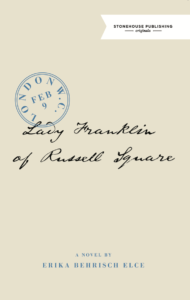November 21, 2018
Lady Franklin of Russell Square
 There is such a thing as a “[John] Franklinophile,” and I am not one, but still, Erika Behrisch Elce’s novel Lady Franklin of Russell Square delighted me. Written as a series of items discovered in old scrapbooks at Jane Franklin’s childhood home years later by a charwoman, the novel comprises news clippings of stories concerning the search for Franklin, who was presumed missing in late 1847, and also letters Lady Franklin had written for her husband from 1847 to 1857, the years during which went from imminently awaiting her husband’s homecoming to a gradual acceptance that he was not coming back. Not that she ever gives up home completely—she continues to use whatever money she can access to purchase ships and send out search parties, and she continues to engage the government in Britain to continue their search for Franklin’s party, and she solicits aid from abroad as well. No, she is not content to be “the Penelope of England,” as she was called in the press, and she doesn’t go for needlecraft. Instead, she consults maps with the same fervour her explorer husband must have (and the reader gets a sense that they were well matched in their thirsts for adventure), and reads the papers, and lobbies the government, and spends her time among the flowers of nearby Russell Square, with whose gardener she has developed an affinity.
There is such a thing as a “[John] Franklinophile,” and I am not one, but still, Erika Behrisch Elce’s novel Lady Franklin of Russell Square delighted me. Written as a series of items discovered in old scrapbooks at Jane Franklin’s childhood home years later by a charwoman, the novel comprises news clippings of stories concerning the search for Franklin, who was presumed missing in late 1847, and also letters Lady Franklin had written for her husband from 1847 to 1857, the years during which went from imminently awaiting her husband’s homecoming to a gradual acceptance that he was not coming back. Not that she ever gives up home completely—she continues to use whatever money she can access to purchase ships and send out search parties, and she continues to engage the government in Britain to continue their search for Franklin’s party, and she solicits aid from abroad as well. No, she is not content to be “the Penelope of England,” as she was called in the press, and she doesn’t go for needlecraft. Instead, she consults maps with the same fervour her explorer husband must have (and the reader gets a sense that they were well matched in their thirsts for adventure), and reads the papers, and lobbies the government, and spends her time among the flowers of nearby Russell Square, with whose gardener she has developed an affinity.
I loved this book. The letters are funny and smart, and sometimes angry and disappointed, and give the reader a rich perspective on this nineteenth-century woman’s interior life. An interior life that must necessarily be fictional, however, because Lady Franklin herself would destroy much of her personal correspondence, journals and records before her death. But if anyone is qualified to try to put the pieces back together again, it’s Erika Behrisch Elce, a Professor of English at the Royal Military College of Canada and editor of Lady Jane Franklin’s selected letters, As affecting the fate of my husband, in 2009. And I’m fascinated to consider how this novel must have grown out of that project, and how it felt for an academic to be blurring the lines between fact and fiction as she does here—and what kind of an adventure must that have been!
The prose sparkles in this novel, the plot is riveting even as we already know the ending, but maybe the ending is not the point—it’s the waiting instead. There is so much nuance in these letters, and also plot going on deep below the surface, and Elce also provides a remarkable record of the constraints placed on a Victorian woman, particularly one without a husband, the very opposite of the limitlessness imposed on so many men of the same era.





